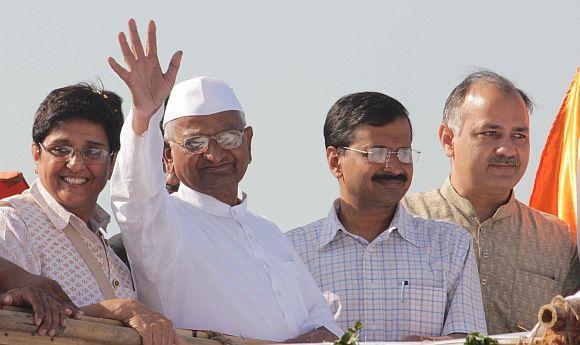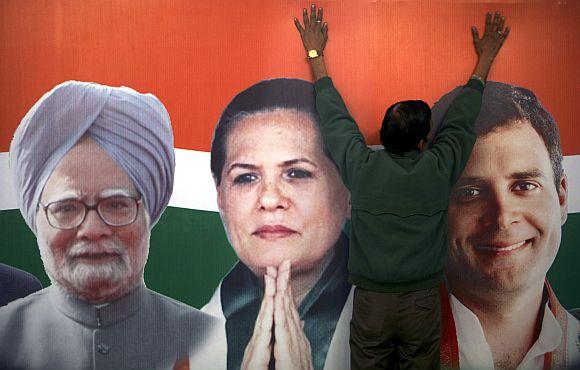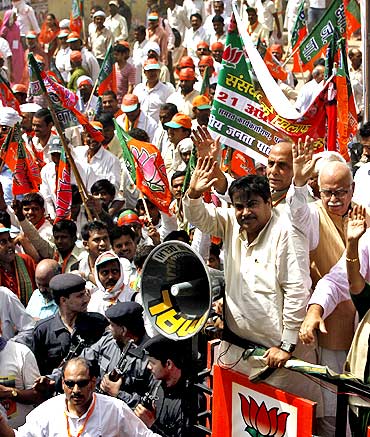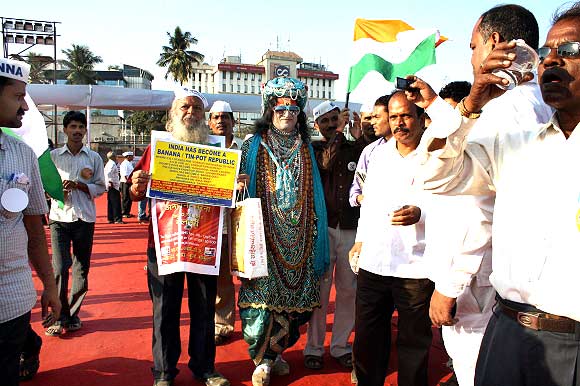Photographs: Sahil Salvi/Rediff.com Saisuresh Sivaswamy in Mumbai
As Annus Horribilis ends with a whimper, the tantalising question is: In its 100th anniversary as the capital of colonial India, will Delhi become the graveyard of yet another dynasty, asks Saisuresh Sivaswamy.
In 1911, when Mohandas Karamchand Gandhi was perfecting his passive resistance movement in South Africa against the apartheid regime, which he later successfully deployed against the British colonial power in India as Satyagraha, little could he have imagined that 100 years later, an old man wearing his trademark topi would employ the same tactic against the party he forged into an instrument of Indian independence.
Was it then, and is it now, merely a case of cometh the hour, cometh the man? Or was the situation ripe, in 1911 and 2011, for the emergence of a symbol of resistance against an effete government, which both Gandhi and Anna Hazare seized?
In Gandhi's case, we have the advantage of hindsight stretching over 100 years. In Hazare's it's but a mere year.
And what a year it has been!
Please ...
'Events of 2011 influenced by last year's misrule'
Image: A worker installs a hoarding at the Congress party's office in JammuPhotographs: Reuters
No moment in history is a standalone --events are but a cascade, each running into the other, impelling and influencing the flow. It could hit a plateau and peter out, or continue its frolic till the very end.
The events of 2011 were influenced by last year's misrule, and as the present one comes to a close there is no sign of the torrent slowing down.
Lessons that ought to have been learnt were ignored, actions that should have been taken were swept aside, making one wonder at times if there was a government at all in place.
All it had was a prime minister who doesn't enjoy his party's confidence; a party president who has no views on anything; and an heir apparent who doesn't enjoy the title.
If that was the United Progressive Alliance, which in 2011 showed little evidence of being either united or progressive and at times even behaved like a misalliance, the Opposition's lot was no better. That the public's trust and faith in the government were whittling had been evident for a while.
Normally this should have been manna from heaven for the Opposition, but so badly was it caught napping that into this vacant space marched Anna Hazare and his merry men and one woman.
If you really think about it, Dr Manmohan Singh's government has done more for transparency than any other government before it. And if you think about it deeply enough, you will also realise that this government has the rare distinction of having at least one honest person in it.
But what happens very often is that the forces of change, the forces of expectations that get unleashed push the bar so high that the very agents of change are often consumed by it, as Mikhail Gorbachev would testify. This force is the wind behind the Jasmine Revolution/Arab Spring that is toppling regimes in its wake.
If Tunisia to Libya showed that there was no such thing as a little democracy, it was either all or nothing, India's own experience in 2011 shows that even democracy, which warts and all remains the best form of governance in all of human history, has its shortcomings.
Please ...
'BJP behaving like it has already won an election slated for 2014'
Image: Bharatiya Janata Party President Nitin Gadkari and BJP leaders L K Advani and Rajnath Singh greet supporters in New DelhiPhotographs: Danish Siddiqui/Reuters
In many ways, UPA the sequel is different from its first avatar in 2004. When it went to the people for a re-election on the plank of the aam aadmi and transparency and asked for freedom from the Left's tyranny, it had the MGNREGs (Mahatma Gandhi National Rural Employment Guarantee Act) and the RTI (Right to Information Act) as showpieces to back its claim. The people believed in its claims, and 2009 came about.
Alas, since that summer two years ago, there has been little evidence of either the aam aadmi or transparency in the government's thought and deed. On the contrary, the RTI has been seen to be a double-edged sword that can equally be wielded against its creators and the aam aadmi has been buried in homilies in the face of a raging inflation. And corruption only completed the tragedy.
That the people were angry was known, but the government didn't take it seriously enough.
That the people were hungry was also known, but the government couldn't care less, or at least that was the attitude shown by its arrogant ministers.
The election results from West Bengal, Tamil Nadu and Bihar should have sounded a warning, but it was lost in the babble that is the UPA. In the first two states the people threw out an entrenched maladministration, while in the third, performance and sincerity were resoundingly rewarded.
What, me worry? That must have been the UPA's motto as it saw its principle opposition, the Bharatiya Janata Party, go through its myriad convulsions over the question of who will be the next prime minister -- the party not only behaving like the UPA's days were over, but also like it had already won an election slated for 2014.
Please ...
'What this government lacks is magic'
Image: At Kisan Baburao 'Anna' Hazare's Mumbai fastPhotographs: Rajesh Karkera/Rediff.com
The first sign of civil disobedience came in the form of a saffron-clad yoga guru. As the televangelist yogi's hunger strike gathered crowds, the government initially seemed to prefer kid gloves before revealing its iron fist. That it could get away with the use of brute force in the wee hours against a peaceful crowd, in which one protestor died, should have emboldened the administration when Anna Hazare stepped up to the plate.
Hazare, after all, doesn't have a base to speak of even in his home state of Maharashtra (as evidenced by the recent elections to local bodies, in which his target Sharad Pawar's Nationalist Congress Party came up trumps, or the sparse crowds that gathered for his fast in Mumbai, in contrast to his standing room only performance in Delhi only months earlier, forcing him to cut his protest to two days).
However, six months later it was the UPA that is on its knees before an old man who, like Gandhi, is not a politician.
Will the Lokpal, the ombudsman that Hazare and his India Against Corruption colleagues like Arvind Kejriwal, Prashant Bhushan and Kiran Bedi have been demanding of the UPA, change things for the better?
The jury is out and probably will never return on that one. But one doesn't need to be Einstein to see that creating a new superset of bureaucracy is not the best way to eliminate corruption by the existing bureaucracy, that there is no dearth of laws outlawing misdemeanour in India, what has been lacking is the will to implement them.
The source of the mass anger against the government, and all politicians, is not over the presence or absence of a Lokpal, but against a callous government that has forgotten the people who voted it to power.
You can pull out rabbits like foreign direct investment in retail and the Food Security Act from the hat, but that still won't make you a magician. What this government lacks is magic, which is different from sleight of hand, which has been in abundant evidence.
As Annus Horribilis ends with a whimper, the tantalising question is: In its 100th anniversary as the capital of colonial India, will Delhi become the graveyard of yet another dynasty?
Please ...





article